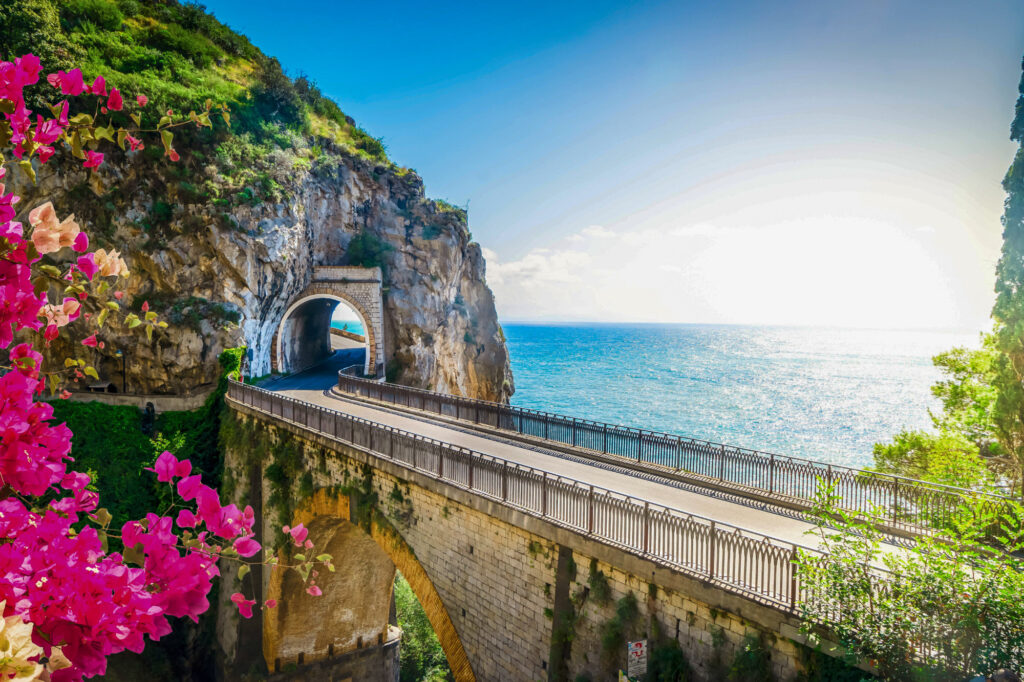
barcelona, SPain
Barcelona in 3 days: an itinerary for the initiated
The Mediterranean • Insider guides • Barcelona in 3 days: an itinerary for the initiated
How to spend 3 days in Barcelona
Barcelona’s rhythm definitely in the details. And you only catch them by being here. The regulars stacking up at the bar before work, the baker sliding trays of ensaïmadas into the street air, the clang of skateboards in MACBA square, the slow burn of vermouth Sundays that stretch into evening. This isn’t a city that hands itself over, you have to know when to show up and where to drift once you do. Three days won’t cover everything, but it can tune you into the pace locals move at – mornings that start sharp, afternoons that fade soft, nights that rarely wrap before sunrise. Think less sightseeing, more immersion. This itinerary maps the bars, cafés, corners and cultural detours that actually pulse with the city.
Day 01



15.00
Check-in time
It’s check-in time at our home away from home, Hotel Casa Sagnier, a converted Modernista mansion on Rambla de Catalunya. This building was architect Enric Sagnier’s own home (built in 1892 as Casa Dolors Vidal de Sagnier). Today it’s a discreet boutique hotel, the kind of place in Eixample design circles that people talk about for its balance of history and contemporary polish. The façade still reflects early 20th-century grandeur, while the interior décor still feels residential. Featuring wood-panelled walls, herringbone floors and wrought-iron balconies that recall its Gothic past. The ground-floor café, Cafè de l’Arquitecte, is the perfect spot for a quiet aperitivo before heading out.
Read more about Cafè de l’Arquitecte.
Hotel Casa Sagnier
Rambla de Catalunya 104
L'Eixample
Barcelona
Spain
Affiliate link (what is it?)
Photography courtesy of Hotel Casa Sagnier
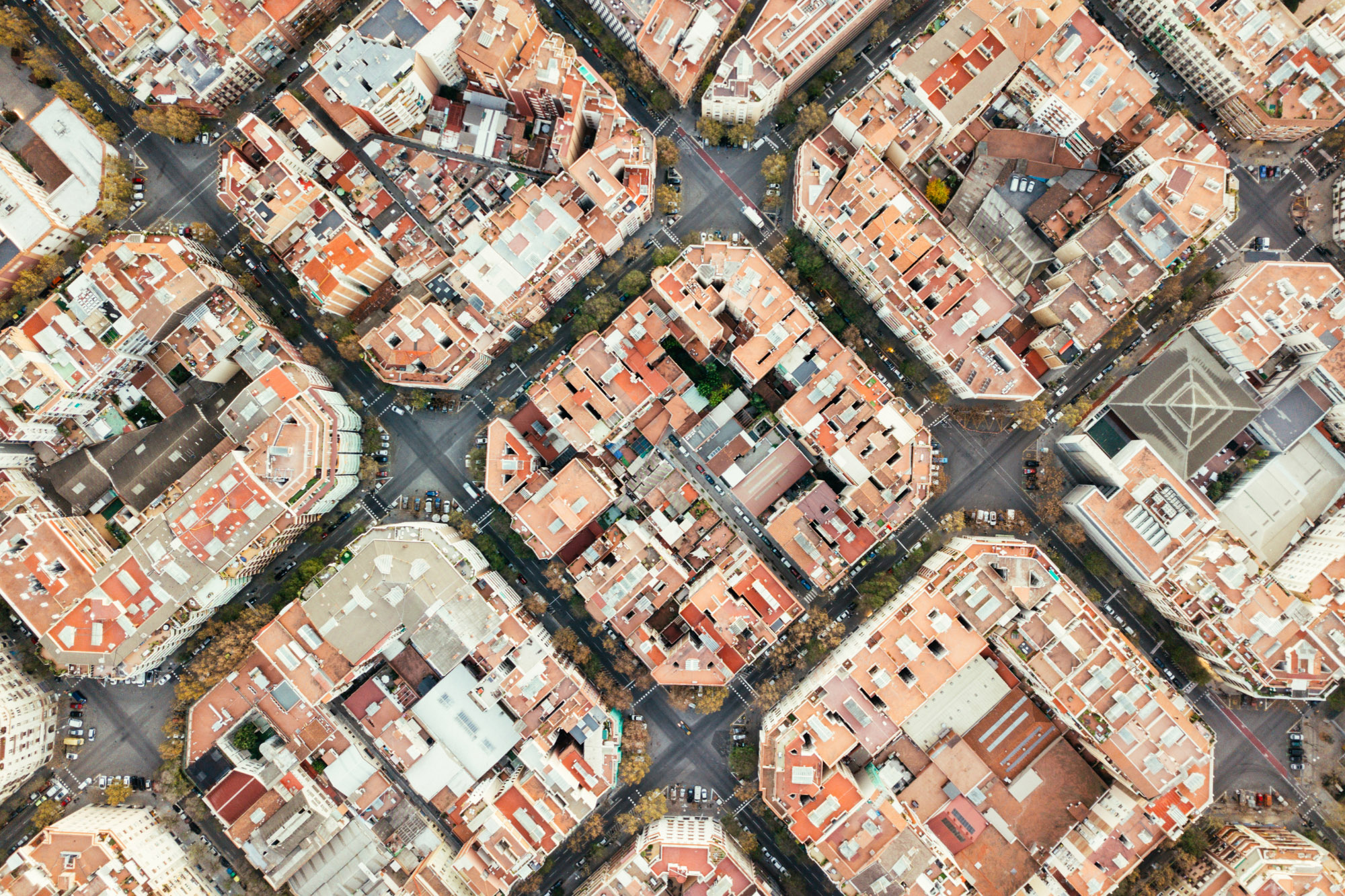
16.00
Take a stroll through Eixample
Walk off the journey by exploring Eixample’s broad, grid-lined avenues. The wide boulevards and geometric grid are iconic, but those who know the area seek out its smaller gestures. Corner cafés where architects sketch plans, boutiques run by Catalan designers and courtyards that bloom with jasmine in summer. Look up at the iconic Modernista buildings (even Gaudí left his mark here beyond Sagnier – Casa Batlló and Casa Milà sit on these blocks, both UNESCO sites.) By late afternoon, the plane trees along Passeig de Gràcia cast cool shadows – the perfect respite before the next stop.
Eixample
Barcelona
Spain

17.30
Catch the light at Casa Milà
A few blocks along Passeig de Gràcia is Casa Milà, Gaudí’s undulating stone apartment block also called La Pedrera. Casa Milà has always divided opinion – when it opened in 1912, neighbours complained it looked like a quarry. A century later, locals know it as Gaudí’s most radical gesture, a building that shifts with light and mood. Visit towards evening, when the rooftop sculptures – chimneys turned into watchful figures – catch the glow of the setting sun. From up here, the spires of Sagrada Família rise in the distance, while the ordered grid of Eixample stretches below. Inside, the museum spaces weave Gaudí’s philosophy into the present, often hosting temporary exhibitions that speak to contemporary culture.
Casa Milà
Pg. de Gràcia 92
L'Eixample
Barcelona
Spain

19.00
Unwind with a sunset walk in Park Güell
Ask a local and they’ll tell you: Park Güell belongs to the evening. By then, the daytime crush has thinned and the park softens into a more contemplative space. Built as a housing project-turned-public park, it overflows with mosaic salamanders, candy-coloured benches and gingerbread-like pavilions. Park Güell has been a UNESCO World Heritage site since 1984 and with good reason – it’s the dreamiest Gaudí creation. For the best view, walk to the back edge of the park for a golden sunset over the city (many tourists miss this quieter corner). From here, the sea glimmers and the rooftops stretch to the horizon.
Park Güell
Gràcia
Barcelona
Spain


20.00
Raise a glass in a garden of botanicals
Step through an unmarked door on Comte Borrell and you enter Kàktos Botanical Society, a secretive plant-filled cocktail den. Kàktos Botanical Society is a greenhouse-meets-bar, filled with greenery and the scent of herbs. Drinks are experiments in botany. Cactus-flower mezcal, gins infused with Mediterranean herbs and cocktails garnished with thyme or petals. By night, the candles glow against the jungle of houseplants. Sit among the succulents and sip the famed Bloody Vulgaris (a beet-infused Bloody Mary) – it comes with beet foam and cava and is as red as vermouth itself.
Káktos Botanical Society
Carrer del Comte Borrell 147
L'Eixample
Barcelona
Spain
Photography courtesy of Káktos Botanical Society


21.30
Dine playfully at Disfrutar
For dinner, head to Disfrutar, the 3-Michelin-starred gem run by former El Bulli chefs – Oriol Castro, Eduard Xatruch and Mateu Casañas. Since opening in 2014, it’s become the go-to spot if you’re looking for playful, avant-garde Mediterranean cuisine with a strong experimental edge. The name literally means “enjoy” and the experience is designed around surprise and delight. The tasting menus here are playful – imagine nitro-frozen gazpacho lollipops or paella presented as a parmesan mousse – all precise and delicious. The dining room is light-filled and understated, letting the dishes take centre stage.
Disfrutar
Carrer de Villarroel 163
L'Eixample
Barcelona
Spain
Photography courtesy of Disfrutar

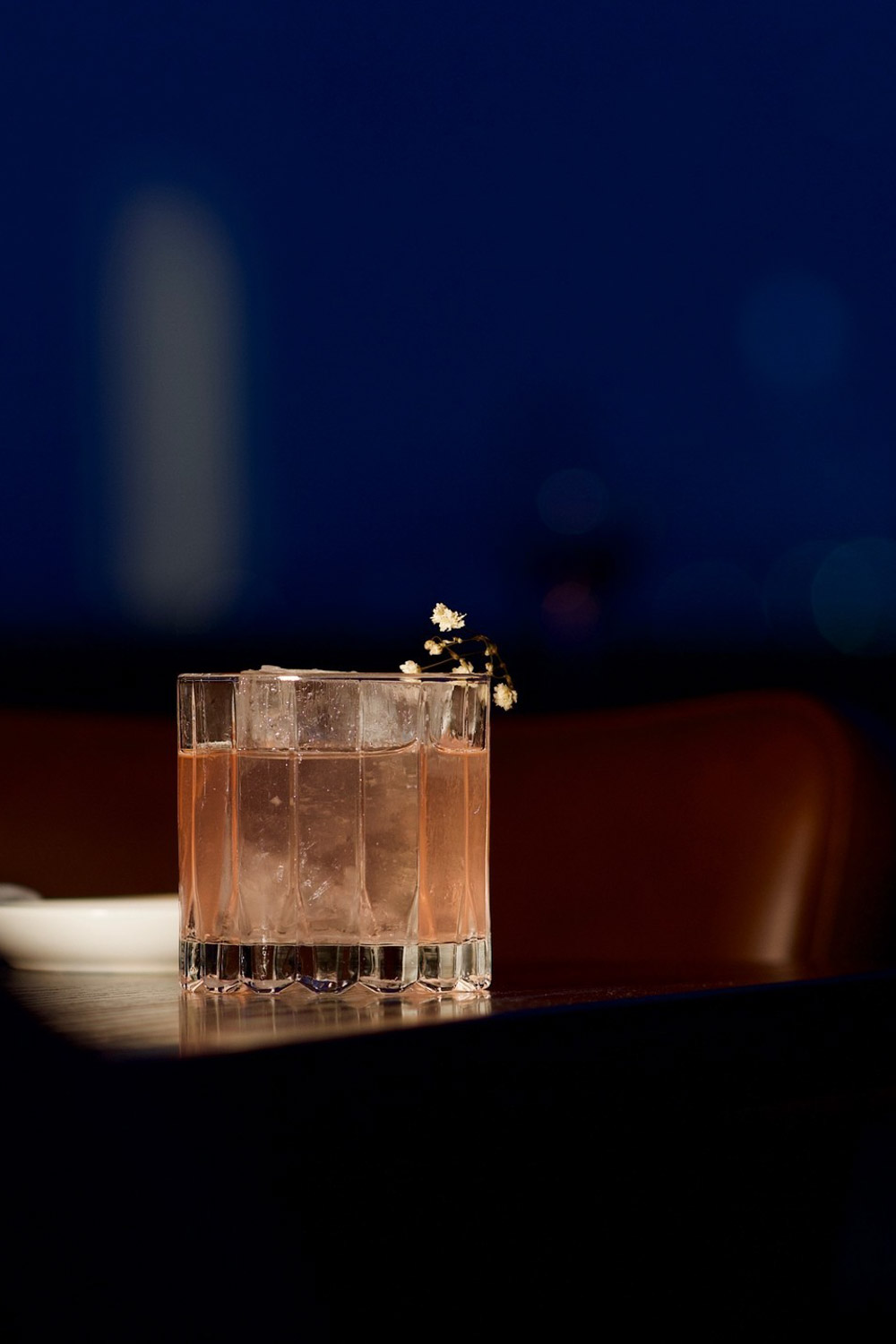
23.30
End the night high at Nobu Rooftop
Cap off the night with a nightcap at the Nobu Hotel’s rooftop bar. In late summer, the space hums with an international crowd, while winter nights draw locals who come for sake cocktails and the city view without the rush. The panorama stretches from Montjuïc to the sea, but it’s the atmosphere that insiders come for. Low beats from a DJ, soft lighting, a pool-lined terrace and a sense of elevation that isn’t just physical. Order a mango-sake martini while looking over the twinkling Passeig de Gràcia. It’s a classy send-off before lights out in Barcelona, a city that never really sleeps.
Nobu Rooftop
Avinguda de Roma 2
Distrito de Sants-Montjuïc
Barcelona
Spain
Photography courtesy of Nobu Hotel
Day 02
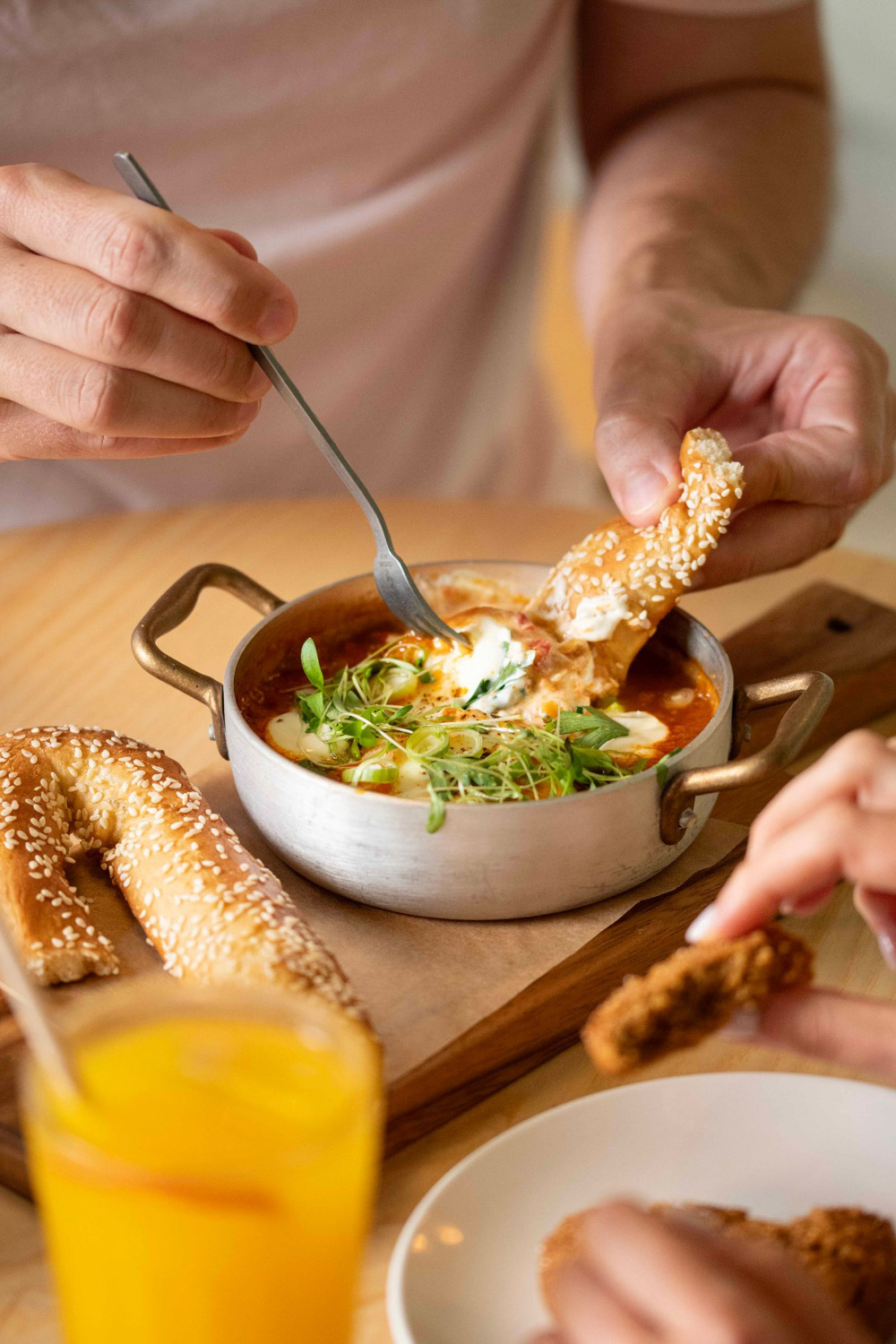

08.30
Start the day at The Egg Lab
Start day two with brunch at The Egg Lab, a breakfast spot loved by creative locals for its playful spin on morning staples. At The Egg Lab, eggs are the star of the show, but they’re never boring. Forget standard eggs Benedict – here it might arrive with kimchi hollandaise or scrambled eggs folded with truffle and parmesan. For something lighter, the Turkish Healthy Breakfast offers poached eggs, falafel, avocado and fresh veggies on Turkish bread. We love the feel-good vibe of The Egg Lab. It’s a bright spot (literally – big windows and potted plants) and a taste of the farm-to-table spirit here.
The Egg Lab
Carrer de Sepúlveda 80
L'Eixample
Barcelona
Spain
Photography courtesy of The Egg Lab


09.30
Explore marble, glass and grand gestures
Take the bus or funicular up Montjuïc to explore the architecture. First stop: the Mies van der Rohe Pavilion. This 1929 International Expo pavilion was rebuilt in glass, steel and white marble and it’s pure Bauhaus elegance. An icon of modernism, it was reconstructed in 1986 exactly as Gaudí’s era chose its materials. Next, wander across the fountain plaza to the Palau Nacional – that grand Spanish-Renaissance palace on the hill. Built also for the 1929 Expo, its steps and dome now house the National Art Museum of Catalonia. From here, you get sweeping views of Barcelona, so pause for photos before heading down.
Mies van der Rohe Pavilion
Av. de Francesc Ferrer i Guàrdia 7
Sants-Montjuïc
Barcelona
Spain
Palau Nacional
Parc de Montjuïc
Barcelona
Spain
Photography courtesy of Mies van der Rohe Pavilion


11.00
Wander the streets of Poble Sec
Poble Sec is a neighbourhood of contrasts, pressed between Montjuïc and the city’s core. Once a working-class quarter, it’s now one of Barcelona’s hipper corners – though still more secret than showpiece. The vibe is raw but magnetic: small theatres and vermut bars sit beside tapas joints that have outlived trends. Carrer de Blai is the artery, with pintxos and vermouth flowing as locals spill onto the pavement. Slip into Parc de les Tres Xemeneies, where skaters carve lines beneath the hulking factory chimneys left behind by the city’s industrial past. For Barcelonans, this is a meeting ground – pull up a stool at a timeworn bar and you’ll be folded into the evening’s chatter before long.
Poble Sec
Barcelona
Spain


12.30
See the Sagrada in a new light
Now head back to the heart of the city to see La Sagrada Família. It’s Gaudí’s colossal unfinished basilica – the largest unfinished church in the world. Its forest of stone spires dominates the skyline, funded entirely by visitor donations. By lunchtime, the crowds are thick (it’s Barcelona’s number one landmark), but don’t skip it – the interior, with its kaleidoscope stained-glass light, is jaw-dropping. If you can, buy a tower ticket: climbing among those spires (with gargoyles guarding you) is unforgettable. Gaudí hoped to finish by his 2026 centenary, so this is one final century of construction.
Basílica de la Sagrada Família
Carrer de Mallorca 401
L'Eixample
Barcelona
Spain
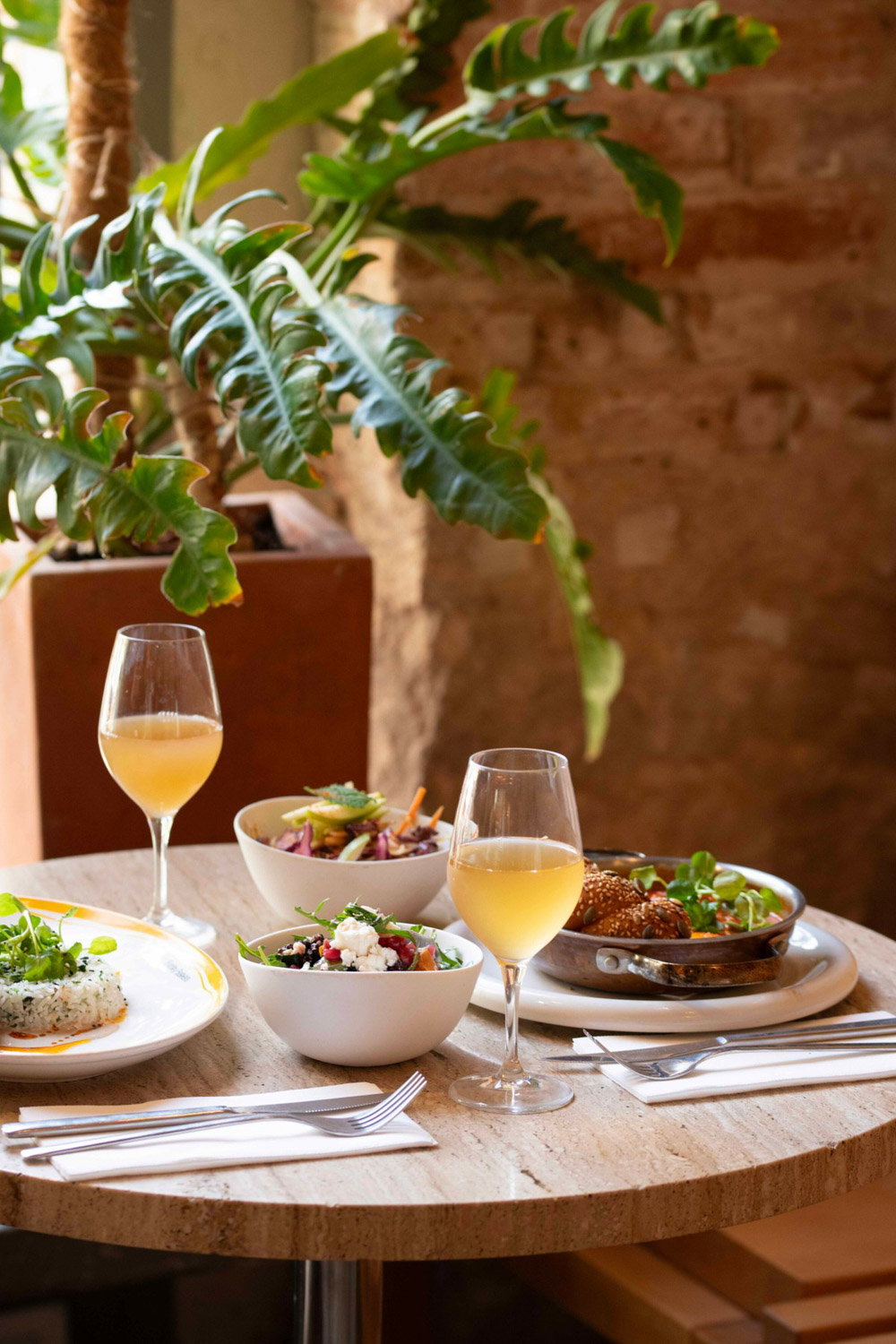
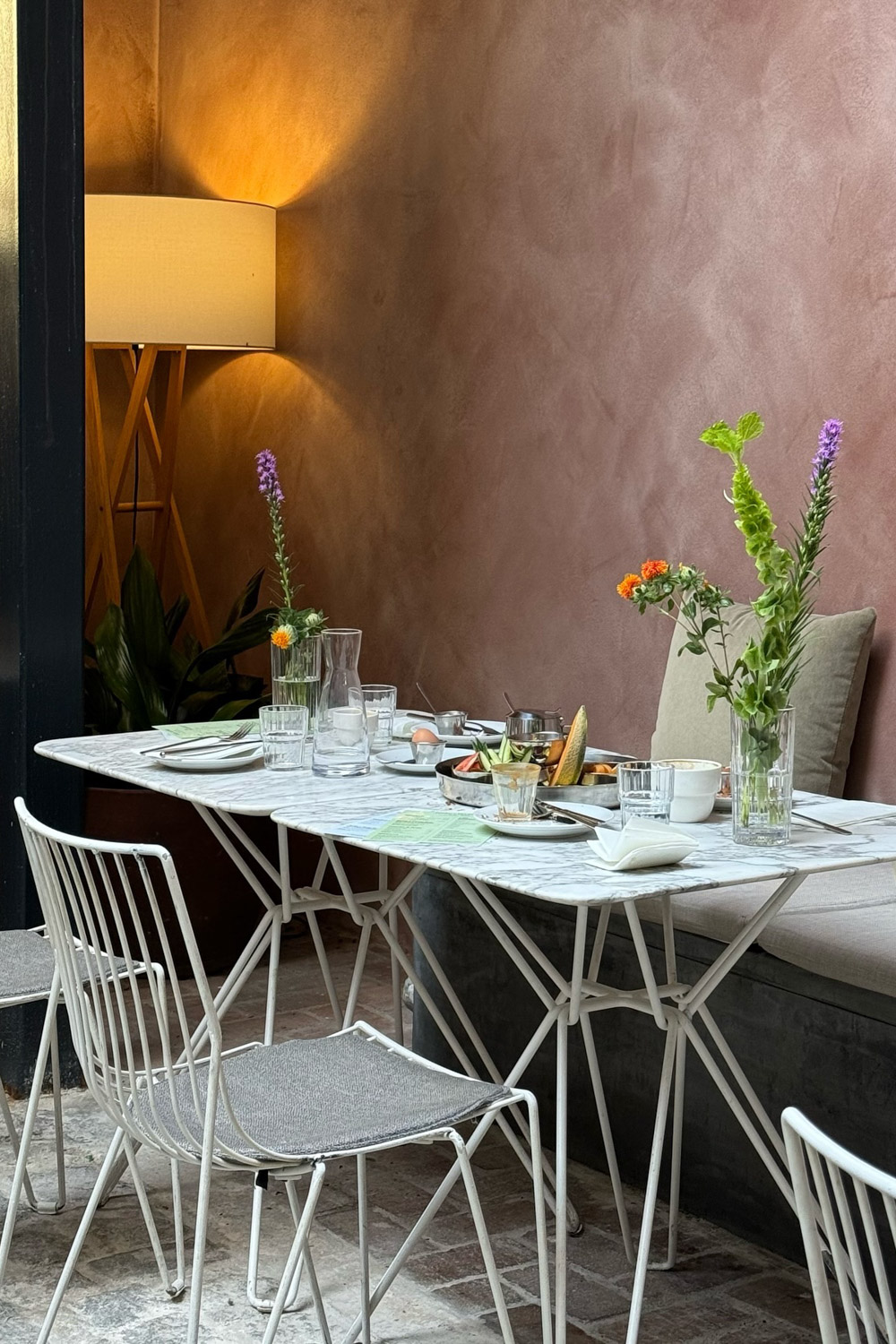
14.00
Grab a bite at Funky Bakers
Set within Hotel Brummell, Funky Bakers is the café locals wish they could keep to themselves. In this light-filled café, the bakery case overflows with freshly baked cakes and buns and the kitchen churns out innovative brunch and lunch dishes using local produce. Expect treats like cardamom swirls, miso brownies and roasted vegetable tartine. The atmosphere is bright, airy and filled with the kind of easygoing creativity that defines the city’s current food scene. Our favourite spot is the sunny indoor-outdoor terrace. Sit back, enjoy the breeze and watch Montjuïc’s cable car swoop overhead.
Funky Bakers
Hotel Brummell
Carrer Nou de la Rambla 174
Sants-Montjuïc
Barcelona
Spain
Photography courtesy of Funky Bakers

16.00
Lose track of time in the Montjuïc gardens
Spend the afternoon strolling Montjuïc’s parks. This is where the city folk come to escape the noise. In spring, the hillside blooms with wildflowers; in autumn, it’s a patchwork of muted tones. Start at the Font Màgica (Magic Fountain) and wander through terraced gardens. Duck into the Mirador del Alcalde for palm-framed views of Port Vell or lose time in the lush Joan Brossa Gardens (giant sculptural musical instruments among the pines). Montjuïc is best explored slowly, with pauses for a vermut at a hilltop kiosk or a quiet moment watching ships move in and out of the port.
Montjuïc
Ctra. de Montjuïc, 66
Sants-Montjuïc
Barcelona
Spain

17.30
Browse objects with an edge
Forget mainstream shopping streets – Vasto Gallery is where Barcelona’s design-savvy set goes hunting. Part gallery, part concept store, it curates limited-edition pieces across art, fashion and objects that blur the line between function and form. Catalan designers have rotating exhibitions here that keep the space feeling alive. Inside, you’ll find collectible chairs, avant-garde lamps and craft objects you won’t see on major shopping streets. Even if you leave empty-handed, spending time here gives a sense of what creative Barcelona looks like right now: experimental, bold and highly individual.
Read more about Barcelona’s one-of-a-kind retail spots.
Vasto Gallery
Carrer de Llull 109
Sant Martí
Barcelona
Spain
Photography courtesy of Vasto Gallery


19.00
Time for some vino
Masa Vins has the intimacy of a living room, but with shelves stacked high with natural wines from across Catalonia and beyond. The shelves lean toward Catalan vintners pushing boundaries – cloudy pét-nats, wild oranges, bottles that taste of mountain herbs. Arrive curious and you’ll leave with both a glass and a new obsession. Ask for a recommendation and the staff will pour something unusual, whether from a tiny producer in the Catalan countryside or a cellar further afield. The place hums in the early evening, soft light spilling across wooden tables, chatter flowing as freely as the bottles. The whole place feels welcoming and soon you will be swapping Barcelona tips with whoever’s at the next stool.
Masa Vins
Carrer de Pallars 154
Sant Martí
Barcelona
Spain
Photography courtesy of Masa Vins


21.30
Enjoy Catalan classics
Cruix is where Catalan tradition meets cheeky reinvention. Its small, buzzing dining room is filled with locals who come as much for the atmosphere as the food. The exposed brick walls and friendly service create a welcoming atmosphere, while the food is anything but ordinary. Chef Miquel Pardo, with experience at renowned establishments like Jordi Cruz, Rafa Peña and Albert Adrià, brings culinary artistry to traditional dishes. You can choose between two tasting menus – the 11-course Classic Cruix or the 13-course Grand Cruix. Our favourite dish is the paella, which comes with a perfect crispy socarrat at the bottom. And you can’t leave without a sweet ending – give the olive oil sorbet a try.
Cruix
Carrer d'Entença 57
L'Eixample
Barcelona
Spain
Photography courtesy of Cruix
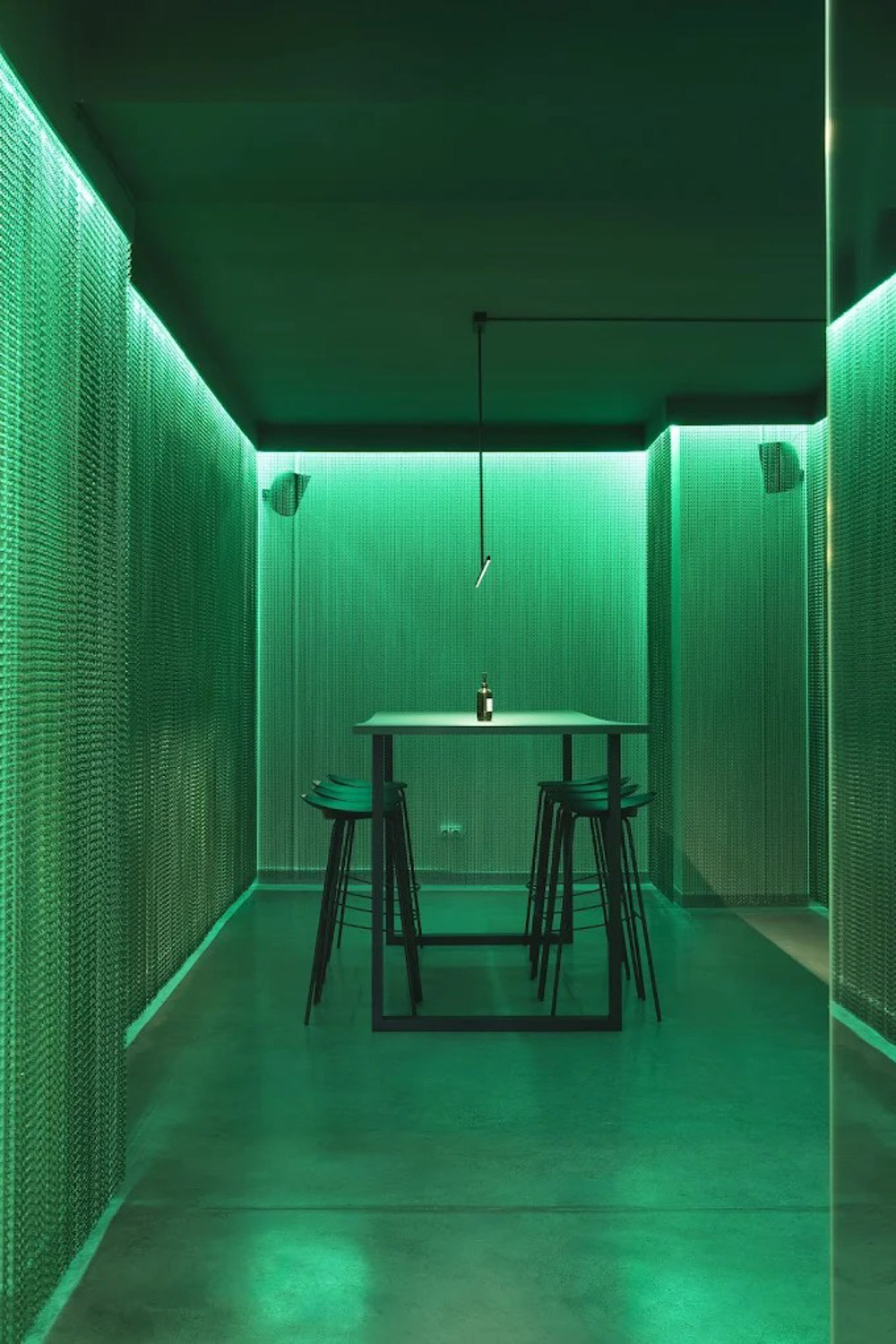

23.30
Slip into the night at Apothucker
If you still have energy, head to Apothucker for one last drink. This is a mixology bar disguised as an old pharmacy. Inside you’ll find vintage apothecary cabinets, neon remedy signs and barrels of mysterious tinctures. It’s intimate, moody and constantly shifting with the crowd. The vibe is quirky and late-night: DJs spin electronic tunes and the clientele is a mix of hip locals looking for something offbeat. The menu is a list of “remedies” rather than cocktails – choose a drink “to soothe the soul” or “cure your wanderlust”. Everything is mixed in-house (you can even see the bottles and herbs behind the bar).
Apothucker
Carrer de Viladomat 43
L'Eixample
Barcelona
Spain
Photography courtesy of Apothucker
Day 03


08.30
Ease in with coffee at Little Fern
Begin the day at Little Fern Café, a bright, New Zealand–inspired brunch spot. Big windows let in sunlight onto wooden tables and potted ferns. Brunch here takes cues from New Zealand but with Mediterranean accents – sourdough stacked with miso butter, bowls bright with seasonal fruit, turmeric-scented eggs and fluffy pancakes. The appeal isn’t just the food but the sense of rhythm: slow, communal, unhurried. As a nod to its Kiwi roots, Little Fern Café takes its coffee seriously. They serve speciality coffee from Ozone, a renowned New Zealand roaster. Trust us, the flat white is a must. Grab a seat on the outdoor terrace – it’s a great spot for people-watching and soaking in the atmosphere and scenery.
Little Fern
Carrer de Pere IV 168
Sant Martí
Barcelona
Spain
Photography courtesy of Little Fern

09.30
Get lost in the streets of Barri Gòtic
Spend the morning getting lost in the Barri Gòtic, Barcelona’s mediaeval heart. This is the oldest part of the city, where narrow, cobbled alleys wind between crumbling walls and tiny plazas. With low sunlight at this hour, the quarter feels like its own little village. Check out the neo-Gothic cathedral from outside, then explore the quiet squares like Plaça Sant Felip Neri (its fountains and baroque church make it feel hidden away). Its streets are too narrow for most traffic, so you’ll hear more footsteps than car engines. This is Barcelona for morning strollers: cafés are setting out croissants, locals warm up their bocadillos and the air still smells of freshly roasted coffee.
Barri Gòtic area
Barcelona
Spain


11.00
Step inside Miró’s world
Set on Montjuïc, the Fundació Joan Miró is both a museum and a sanctuary. This low-rise, white concrete museum by architect Josep Lluís Sert was designed to let the Mediterranean light flood in, complementing Miró’s primary colours. Inside, airy galleries showcase hundreds of Miró’s pieces – his paintings, sculptures and ceramics. The grounds are serene – wander the sculpture garden or sip espresso on the terrace with a panoramic city view (Miró himself loved that spot). It’s a quieter, equally inspiring counterpoint to Gaudí’s work – Barcelonans come here for the creative energy and the chance to see a lesser-known master up close.
Fundació Joan Miró
Parc de Montjuïc
Sants-Montjuïc
Barcelona
Spain
Photography courtesy of Fundació Joan Miró


12.30
Pause with a coffee and a pastry
Take a midday breather at Vitrina Café. This tiny café flies slightly under the radar – you might walk right past it if you didn’t look closely. Once inside, it’s friendly and relaxed with open windows and soft jazz playing in the background. The design is stripped back – white walls, soft light, a few round tables and pastries lined like artwork behind glass. Coffee is the draw, locally roasted coffee from Familia Osorio, but don’t miss out on the flaky croissants or the banana bread topped with espresso mascarpone. A must-try if you have a sweet tooth. If the terrace is open, grab a seat outside – if not, sit by the counter and watch the world hurry by on Carrer de Calàbria.
Vitrina Café
Carrer de Calàbria 128
L'Eixample
Barcelona
Spain
Photography courtesy of Vitrina Café


13.30
Vermut lunch at Varmuteo
Barcelona’s vermut culture lives at Varmuteo. It’s the sister restaurant to the Michelin-beloved Al·Àpat. Here, lunch is less a meal and more a ritual – a glass of sweet, herbal vermouth paired with small plates designed for sharing. The chalkboard menu reads like an alchemist’s notebook. Pickles, croquettes, anchovies and patatas bravas, all designed to pair with a glass of house-fermented vermut. Everything is made in-house – they even ferment ingredients themselves to deepen the flavour. The décor nods to old bodegas but with enough edge to draw a younger crowd, those who see vermut not as nostalgia but as part of Barcelona’s present.
Varmuteo
Carrer de Vilamarí 3
L'Eixample
Barcelona
Spain
Photography courtesy of Varmuteo
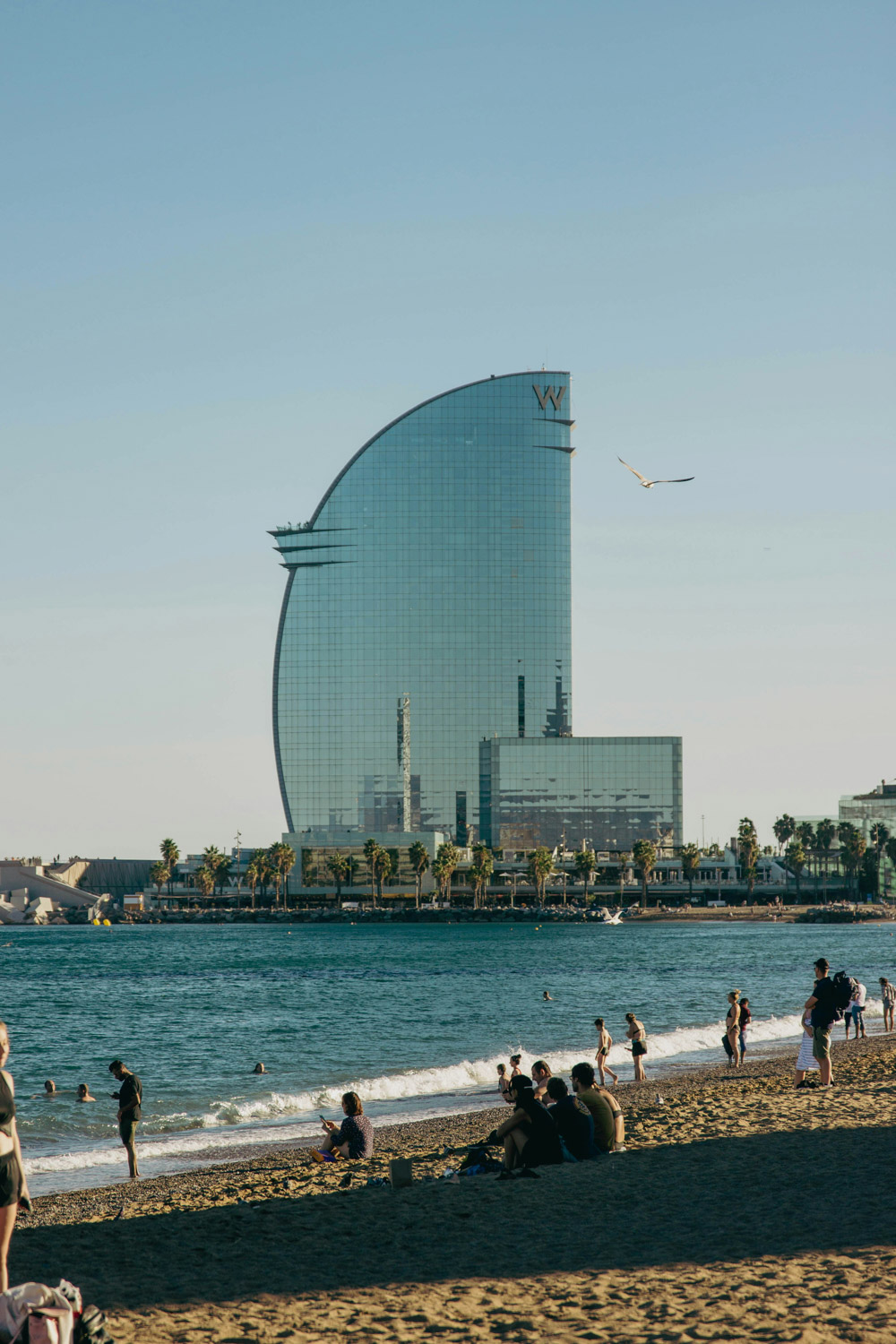
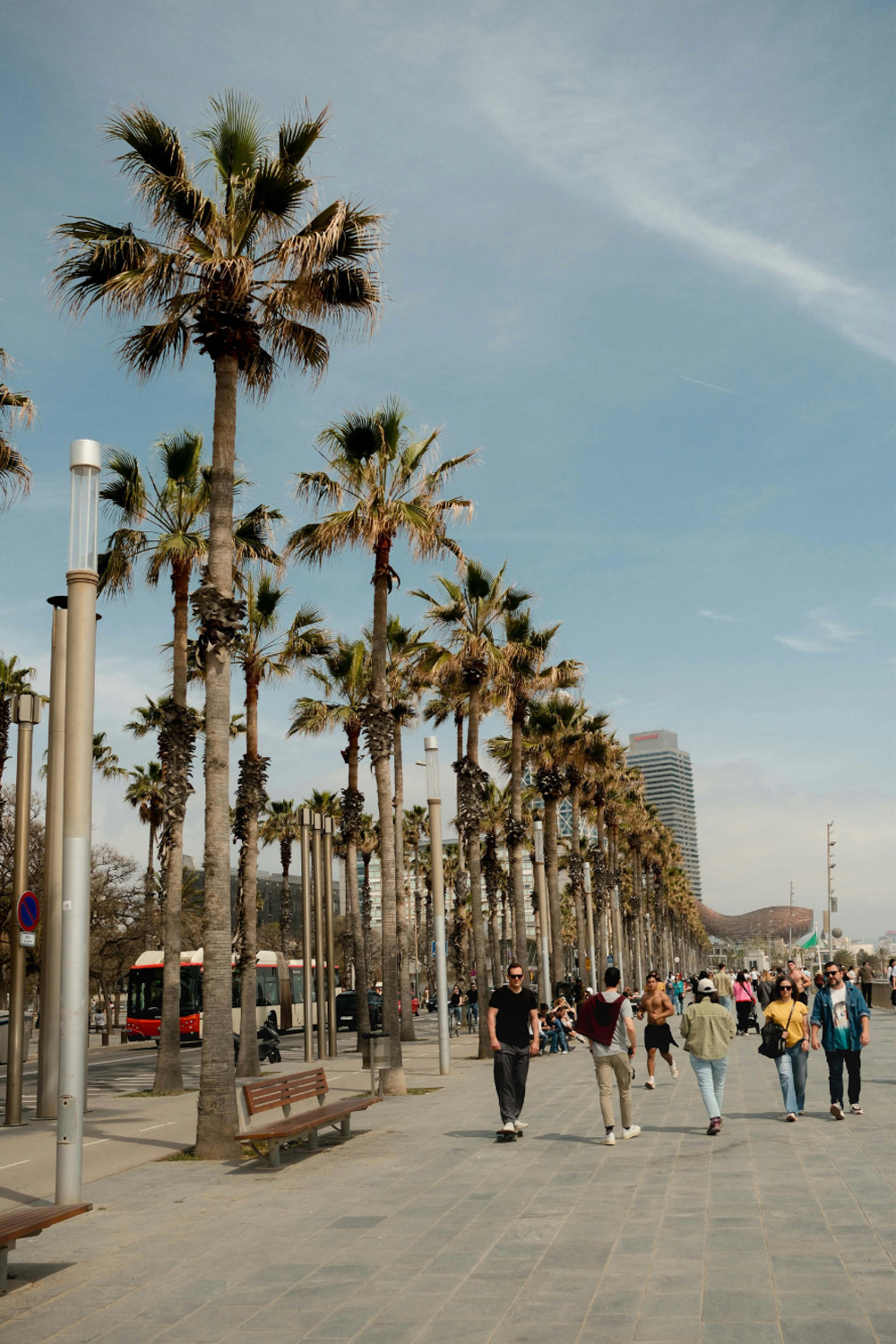
15.00
Walk the shoreline at La Barceloneta
You can’t leave Barcelona before visiting the iconic La Barceloneta. The old fishermen’s quarter of La Barceloneta offers both a true beach and a pedestrian waterfront promenade. By late afternoon, the crowds have thinned a bit, so relax on the sand with a café con leche or stroll the palm-lined boardwalk. Stop for a gelato or join the locals grilling fresh sardines (espetos) by the chiringuitos (beach bars). Don’t leave without admiring Frank Gehry’s giant goldfish sculpture (El Peix) near the port. It glints in the sun and marks the east end of the beach. Bask in the warm breeze as the Mediterranean stretches to the horizon. Here, the city’s pace slows down – watching kite-surfers or the sunset over W Hotel is the perfect reflection of Barcelona’s mix of urban life and sea.
La Barceloneta
Ciutat Vella
Barcelona
Spain


17.00
Learn the art of paella
For your last act, get your hands dirty at The Paella Club. This fun cooking class celebrates the love of cooking, culture and community. In an exposed-brick kitchen, you’ll learn to cook not just paella, but also pan tomàquet and sangria – all while making new friends. The instructors keep the mood light, pouring cava and singing along to Spanish pop as you sauté. By the end, each table has a perfect saffron rice bubbling in the pan (and an even bigger buzz from the bottomless wine). It’s more than a class; it’s a party and a fitting finale. Afterwards, you’ll enjoy the paella you made together – a last taste of Catalonia before saying adiós to the city.
The Paella Club
Carrer del Doctor Dou 5
Ciutat Vella
Barcelona
Spain
Photography courtesy of The Paella Club
Share this
Stay in the know
Sign up for the latest hotspot news from the Mediterranean.
